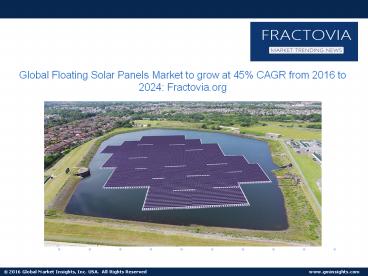U.S. Floating Solar Panels Market volume to grow over 67% by 2024 - PowerPoint PPT Presentation
Title:
U.S. Floating Solar Panels Market volume to grow over 67% by 2024
Description:
More Information @ Floating solar panels are connected through on grid systems and off grid systems. On grid floating solar panels industry is expected to grow at an annual rate of more than 45% during the period of 2016 to 2024. Various financial benefits such as tax concessions and feed -in- tariffs offered by the government will help in enlarging the industry size. – PowerPoint PPT presentation
Number of Views:60
Learn more at:
https://www.fractovia.org/request-sample/403
Title: U.S. Floating Solar Panels Market volume to grow over 67% by 2024
1
Global Floating Solar Panels Market to grow at
45 CAGR from 2016 to 2024 Fractovia.org
2
Key Insights of Floating Solar Panels Market
- Floating Solar Panels Market size is set to
exceed 2.5 GW by 2024 fuelled by increasing
adoption of clean energy sources. The world has
been observing a linear shift toward the adoption
of renewable energy, a factor that is majorly
fueling floating solar panels market. Subject to
deforestation and global warming, not to mention,
the tremendous rise of urbanization and
industrialization, the land availability across
the globe has reduced drastically. This will lead
to an increase in the adoption of floating
panels, given the difficulty level for installing
ground-mounted panels, thereby stimulating
floating solar panels industry. - Major corporations across the globe have been
striving to develop highly efficient and
economical products to encourage increased
adoption of these panels. The remarkable efforts
by key participants such as Pristine Sun, Ciel
Terre, Solaris Synergy, Novaton AG, SPI Energy,
Sunengy Pty, Yingli Solar, Vikram Solar, and
Kyocera Corporation will lead global floating
solar panels market to grow at a remarkable
compound annual growth rate over the next few
years. In fact, Kyocera Corporation recently
completed the installation of the worlds largest
solar power plant in Japan with a capacity of
14.5 MW. More than 4,900 of the countrys homes
are likely to be powered with this plant in the
years to come. In addition, the availability of
less land coupled with the reduced availability
of natural resources will also drive Japan
floating solar panels industry, which earned over
USD 14 billion in 2015.
3
Continued
- APAC floating solar panels market will be
propelled mainly by China, Japan, and India.
Driven by the rising investments on the
installation of PV systems, China floating solar
panels industry will earn USD 140 million by
2024, with a CAGR estimation of 30 over
2016-2024. U.S. floating solar panels market, on
the other hand, is forecast to generate a revenue
of USD 250 million by 2024, with a staggering
CAGR of 67 over 2016-2024. - Primarily augmented by the cost-effectiveness,
floating stationary solar panels industry held
over 90 of the overall revenue in 2015, and is
expected to grow significantly over 2016-2024.
Solar panels with a capacity between 1 to 5 MW
are extensively utilized for large-scale
photovoltaic projects, which will propel floating
solar panel market size from 1 to 5 MW capacity. - The governments of various nations have been
tirelessly working toward achieving extensive
utilization of floating solar panels. In lieu of
this fact, many of them have been providing
supportive financial schemes such as feed-in
tariffs, tax rebates, subsidies, and the like,
which will augment on-grid floating solar panels
market. - Floating solar panels, being a viable, efficient,
and cost-friendly alternative to ground-mounted
PV systems, are being adopted extensively all
over, boosting floating solar panels market. In
addition, stringent government rules to curb the
GHG emissions will also propel this industry in
the next few years.
4
Global Floating Solar Panels Market, By Capacity,
2013 - 2024 (MW)
5
Browse Full Market Research Report Of Floating
Solar Panels Market _at_ http//bit.ly/2q8hM8W
Request for a Sample of this Research report _at_
https//www.fractovia.org/request-sample/403
6
Table of Contents
Chapter 1 Methodology Scope 1.1
Methodology 1.1.1 Initial data
exploration 1.1.2 Statistical model and
forecast 1.1.3 Industry insights and
validation 1.1.4 Scope assumptions 1.2
Data Sources 1.2.1 Primary 1.2.2.
Secondary Chapter 2 Executive Summary 2.1
Floating solar panels industry 3600 synopsis,
2013 - 2024 2.1.1 Business trends 2.1.2
Regional trends 2.1.3 Product trends 2.1.4
Capacity trends 2.1.5 Connectivity trends
7
Continued
Chapter 3 Floating Solar Panels Industry
Insights 3.1 Industry segmentation 3.2
Industry size forecast, 2013 - 2024 3.3
Industry ecosystem analysis 3.4 Innovation
sustainability 3.5 Regulatory landscape 3.5.1
Japan 3.5.2 Europe 3.5.3 China 3.5.4
U.S. 3.5.5 India 3.5.6 Brazil 3.5.6
Australia
8
Continued
3.6 Price trend analysis 3.7 Industry
impact forces 3.7.1 Growth drivers 3.7.1.1
Increasing adoption of clean energy
sources 3.7.1.2 High land acquisition
cost 3.7.1.3 High capacity utilization
factor 3.7.2 Industry pitfalls
challenges 3.7.2.1 High initial installation
cost 3.8 Growth potential analysis 3.9
Porters analysis 3.10 Competitive landscape,
2015 3.10.1 Strategy dashboard 3.11
PESTEL analysis
9
Stay In Touch Website https//www.fractovia.org
Social Media































